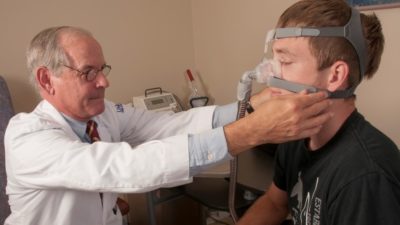UMKC researches non-medical asthma treatment
University of Missouri-Kansas City research has allowed 27-year-old David Pamperin to live life more freely.
Asthma is part of Pamperin’s everyday routine. Inhalers are his constant companion — attacks tend to occur every other day — and cost him hundreds of dollars every few months. So earlier this year when he read an ad for a medicine-free asthma research trial at UMKC, he signed right up.
“I guess you’d call me a severe case,” the FedEx delivery driver said. He’s missed work when his wheezing became unbearable, and has landed in the emergency room. “You really can’t do anything else when you have to concentrate on breathing.”
Asthma is a common lung disease that makes breathing difficult for millions of Americans, both young and old. In 2011, it was estimated that 25.9 million Americans had asthma, including 7.1 million children.
Pamperin made four months of weekly visits to UMKC, one of 18 American Lung Association Asthma Clinical Research Centers in the U.S. Jackson County has high rates of asthma nationwide, leading to increased medication use and hospitalizations. Jackson County has one of the highest rates of asthma-related emergency room visits among children under 15 years old in Missouri, with preschool children, ages 1 to 4, significantly exceeding the overall state rates.
The study, led locally by UMKC School of Medicine researcher Gary Salzman, a pulmonologist at Truman Medical Center, is examining whether a safe, non-pharmaceutical device that is used for sleep apnea can also improve asthma control.
The device, known commonly as a sleep mask, provides CPAP or Continued Positive Airway Pressure. It uses air pressure to keep breathing passages open during sleep, making airways more relaxed.
For the asthma study, clean, humidified air is blown into the lungs in order to prevent airways from collapsing. The chest and lungs are more expanded, helping patients to breathe easier.
On Week 14, near the end of Pamperin’s time in the study, he expressed enthusiasm.
“Physically, I feel better and more confident that tightness in my chest won’t happen when I work,” he said. “The results have stayed consistent. I can’t say the same things about inhalers.”
Salzman says CPAP treatment has huge potential.
“This could improve the lives of millions night and day,” Salzman said. “CPAP could be a good option for those who can’t tolerate medication, want to take less medicine or who just want a natural treatment for asthma.”
Salzman says some patients in the study will get CPAP delivered at higher pressures and some will receive lower pressures. For more information on the study in Jackson County, call 816-404-5503. UMKC is recruiting asthma patients who are non-smokers between the ages of 15 and 60 for the four-month study.
CPAP as an asthma treatment could be a few years from entering the marketplace. As part of the study, Pamperin said he was able to work out without worry, and play softball.
Sleeping while wearing a CPAP mask was an adjustment, Pamperin admits.
“But after a night or two, I was used to it,” he said.
Pamperin hopes that the research that made his life better can do the same for so many others who live with asthma.
“It gives you more control over your life.”

